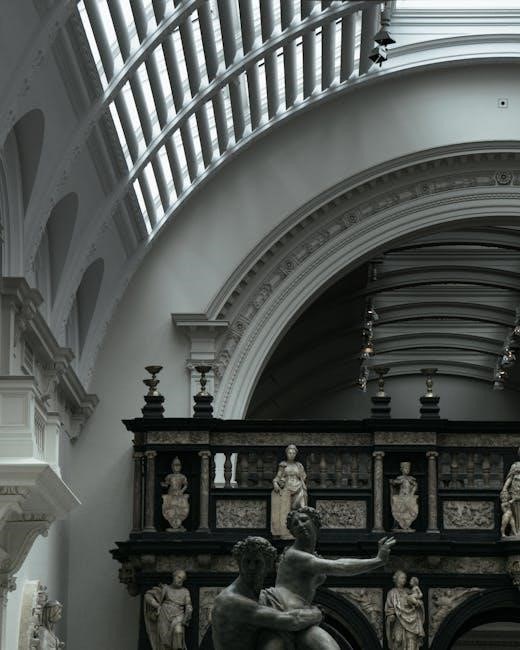Albert Camus’s The Plague is a profound exploration of human resilience, morality, and existential themes set against a deadly epidemic in 1940s Oran, Algeria․
1․1 Background and Context
Written between 1942 and 1947, The Plague reflects Camus’s experiences during World War II and the Nazi occupation of France․ The novel is often seen as an allegory for resistance and resilience in the face of oppression․ Drawing inspiration from historical epidemics, Camus crafts a gripping narrative about human struggle, set in the fictional town of Oran, Algeria, during a deadly outbreak․

1․2 The Novel’s Historical Significance
The Plague, published in 1947, holds deep historical significance as a post-WWII allegory, reflecting resistance against oppression and the human condition during crises․ Its exploration of collective suffering resonated globally, making it a timeless classic․ The novel’s themes of resilience and solidarity continue to inspire, particularly during modern crises like the COVID-19 pandemic, highlighting its enduring relevance and universal appeal․
Plot Summary of “The Plague”
The Plague by Albert Camus tells the story of a sudden and mysterious outbreak of a deadly disease in the Algerian town of Oran, transforming it into a quarantined zone․
2․1 Overview of the Story
The Plague by Albert Camus is set in the fictional city of Oran, Algeria, where a mysterious and deadly plague outbreak transforms the town into a quarantined zone․ The story follows the inhabitants as they face unimaginable suffering, isolation, and moral dilemmas, exploring themes of human resilience, solidarity, and the search for meaning amidst absurdity and despair․
2․2 Key Events and Turning Points
The novel begins with the sudden appearance of dead rats, signaling the outbreak of the plague․ Dr․ Bernard Rieux leads the medical response, while the town’s quarantine creates widespread panic․ The death of a young boy marks a poignant turning point, prompting collective grief and reflection․ As the plague intensifies, the community unites in solidarity, revealing both the best and worst of human nature amidst unimaginable suffering․
Themes and Symbolism in “The Plague”

The novel explores themes of absurdity, existentialism, and human suffering, with the plague symbolizing the unpredictability of life and the search for meaning in chaos․
3․1 The Plague as a Metaphor
The plague in Camus’s novel serves as a powerful metaphor for existential despair, collective suffering, and the absurdity of human existence․ It symbolizes the unpredictability of life, the inevitability of death, and the moral decay that arises in crises․ The plague also reflects historical events like the Nazi occupation, highlighting humanity’s resilience and the search for meaning amidst chaos and injustice․
3․2 Existentialism and Absurdism
Camus’s The Plague embodies existentialist and absurdist themes, exploring humanity’s struggle for meaning in a purposeless world․ Dr․ Rieux’s unwavering commitment to fighting the plague, despite its inevitability, reflects existentialism’s emphasis on choice and responsibility․ The novel highlights the absurdity of suffering, urging individuals to embrace life’s inherent meaninglessness while striving to create their own purpose and dignity in the face of existential despair․

Main Characters and Their Roles
Dr․ Bernard Rieux, a compassionate doctor, leads the fight against the plague, embodying moral strength․ Father Paneloux delivers sermons blaming humanity for the plague, while Jean Tarrou seeks meaning through solidarity and resistance, reflecting Camus’s exploration of human resilience and purpose․
4․1 Dr․ Bernard Rieux
Dr․ Bernard Rieux is the protagonist, a physician who remains in Oran to care for the plague-stricken, embodying selflessness and moral integrity․ His actions are driven by duty, not recognition, showcasing resilience․ Rieux’s internal struggle with the futility of his efforts reflects Camus’s exploration of absurdism․ Despite personal losses, Rieux persists, symbolizing humanity’s capacity for compassion and perseverance in the face of unrelenting suffering․
4․2 Father Paneloux and His Sermons
Father Paneloux, a Catholic priest, delivers two pivotal sermons during the plague․ Initially, he blames the townspeople for the outbreak, framing it as divine punishment․ His rigid interpretation sparks outrage, reflecting societal tension․ Later, he softens, advocating for compassion․ Paneloux’s death from the plague underscores the conflict between faith and absurdity, leaving a complex legacy of judgment, mercy, and existential struggle;

Philosophical and Existential Themes

The Plague delves into absurdism, human suffering, and resilience․ Camus explores the search for meaning amidst chaos, reflecting his philosophy on destiny and the human condition․
5․1 The Absurd and Human Suffering
Camus explores the absurd through the plague’s meaningless devastation, forcing citizens to confront an indifferent universe․ Despite suffering, Dr․ Rieux embodies resilience, highlighting humanity’s capacity for solidarity and moral duty in the face of absurdity; The novel underscores the futility of seeking divine or rational explanations for suffering, emphasizing instead the human need to act with dignity amidst chaos․
5․2 Camus’s Philosophy in the Novel
Camus’s philosophy in The Plague reflects his existentialist views, emphasizing human resilience and moral responsibility amidst absurdity․ The novel illustrates Camus’s belief in living with dignity, regardless of life’s meaninglessness, and the importance of solidarity in the face of suffering․ Through Dr․ Rieux’s unwavering commitment, Camus underscores the value of ethical action and compassion, even when the universe seems indifferent to human fate․

Cultural and Historical Significance
The Plague, published in 1947, became a cultural landmark, resonating with post-war Europe and inspiring global dialogue on human resilience and existential crises, remaining timeless․
6․1 The Novel’s Relevance Today
The Plague remains strikingly relevant today, offering timeless insights into human resilience, empathy, and the collective response to crises․ Its exploration of suffering, solidarity, and existential questions resonates deeply in contemporary contexts, such as global pandemics, making it a universal and enduring work of literature․
6․2 Impact on World Literature
The Plague has left an indelible mark on world literature, solidifying Camus’s reputation as a philosopher-writer․ Its exploration of absurdism and existentialism influenced countless authors, while its timeless themes of resilience and morality continue to resonate globally․ Translated into numerous languages, it remains a cornerstone of 20th-century literature, inspiring philosophical and literary discussions worldwide․
PDF Versions and Availability
The Plague by Albert Camus is widely available in PDF format on platforms like Internet Archive and other digital libraries, offering high-quality translations for global readers․
7․1 Where to Find the PDF
The PDF version of The Plague by Albert Camus can be found on platforms like Internet Archive, Digital Library of India, and various academic repositories․ These sources offer free access to high-quality translations, ensuring readers worldwide can explore Camus’s seminal work conveniently․


7․2 Quality and Translations
The PDF versions of The Plague are available in multiple translations, with Stuart Gilbert’s English rendition being particularly acclaimed․ Ensure downloading from reputable sources like Internet Archive or academic databases to access high-quality, accurate, and complete texts of Camus’s masterpiece․
Study Guides and Resources
Reputable sources like SparkNotes and Internet Archive offer comprehensive study guides, summaries, and analyses of The Plague, aiding students and researchers in deeper understanding․
8․1 Summaries and Analyses
Online platforms like SparkNotes and Internet Archive provide detailed summaries and analyses of The Plague, breaking down its narrative structure, character motivations, and philosophical themes․ These resources are invaluable for students, offering insights into Camus’s exploration of absurdism, moral dilemmas, and human resilience․ Additionally, PDF versions of study guides are widely available, ensuring accessibility for deeper academic exploration of the novel․
8․2 Educational Materials
Educational materials for The Plague include teacher guides, lesson plans, and activity worksheets that facilitate deeper understanding of the novel․ PDF resources from platforms like SparkNotes and Internet Archive offer structured analyses, discussion questions, and thematic explorations․ These tools are designed to engage students, fostering critical thinking about Camus’s philosophical themes, moral dilemmas, and the human condition depicted in the story․

Bibliography and References
Key sources include Albert Camus’s The Plague (1947), translated by Stuart Gilbert, and PDF versions available on platforms like Internet Archive and educational websites like SparkNotes․
9․1 Key Sources and Citations
The primary source is Albert Camus’s The Plague (1947)․ Key citations include the PDF version translated by Stuart Gilbert, available on the Internet Archive and educational platforms like SparkNotes․ High-quality editions from Penguin Books maintain the original integrity․ Additional references are in critical essays and scholarly articles on themes and context, ensuring authenticity․
9․2 Further Reading
For deeper insights, explore critical essays, scholarly articles, and analyses of Albert Camus’s The Plague․ The Internet Archive and Digital Library of India offer free PDF versions․ Works by scholars like Ronald Aronson and Catherine Camus provide valuable context․ SparkNotes and educational platforms also offer detailed summaries and interpretations, enhancing understanding of the novel’s themes and historical significance․
The Plague by Albert Camus remains a timeless exploration of resilience, morality, and existentialism․ Its relevance today underscores human strength amidst adversity, with PDF versions widely available for deeper exploration․
10․1 Final Thoughts
The Plague by Albert Camus is a masterpiece of existential literature, offering profound insights into human resilience, morality, and the search for meaning amidst suffering․ Its timeless themes resonate deeply, making it a crucial read for understanding the human condition․ The availability of PDF versions ensures its accessibility for modern readers, allowing for deeper exploration of Camus’s philosophical and literary brilliance․
10․2 The Legacy of “The Plague”
The Plague by Albert Camus remains a timeless literary masterpiece, leaving an indelible mark on world literature․ Its exploration of human resilience, existential themes, and moral dilemmas continues to resonate globally․ The novel’s relevance endures, as its themes of collective struggle and hope in crisis find parallels in modern challenges․ Its legacy is further cemented by its widespread availability in PDF formats, ensuring its accessibility for future generations․
